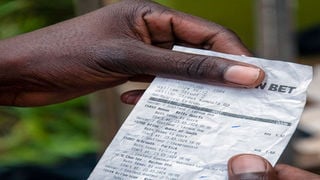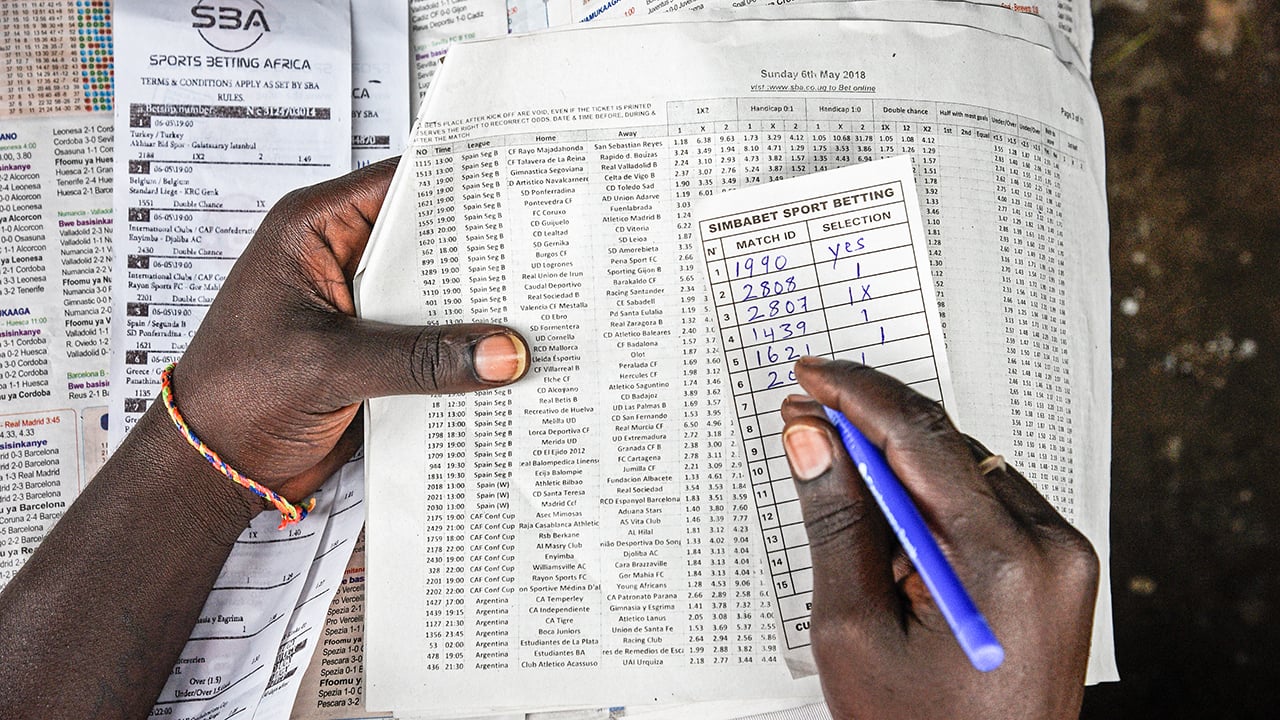
Whereas a total of 89 entities are registered for taxes under the gambling and betting sub-sector according to Uganda Revenue Authority legacy systems, only 44 filed withholding tax. PHOTO/FILE
|Prosper
Prime
When gambling becomes source of income
What you need to know:
The gambling craze has turned from a pastime for jobless youth to a source of income for those trying to make ends meet.
Millions of Ugandans have been drawn ‘into the game’ of sports betting or gaming also known as gambling.
Its impact is rapidly and negatively replacing other factors as the primary cause of long-term poverty among young adults as government attempts to stem this obsession with a tax.
This vice, psychologists say, is openly disguised as an investment but is daylight robbery of the naïve—rich and poor alike. Many who are struggling to make ends meet have turned to it.
Mr Shadiq Hussein Baguma, a policeman, took his own life after losing Shs800,000 that was entrusted in his care due to sports betting.

Many unemployed Ugandan youth have ventured into sports betting to make a living. PHOTO/FILE
It was alleged that a citizen gave Mr Baguma the money because he thought he could be attacked because of the late hour. But Mr Buguma chose to use the money for wagering in the hopes of making impulsive gains before the owner picked it up the next day.
Mr Baguma was unlucky. Many people view the expanding sports betting market as a reliable source of income and a way out of poverty, according to experts and gamblers.
For example, Mr Junior Seruwagi, started betting in 2014. With time, it turned into a full time job.
“On my first bet, I staked Shs500,000. I had Manchester United, Barcelona and Bayern Munich among others, he says.
He adds, “On first bet, I won Shs1.5 million.”
Mr Seruwagi, who embodies the gambling culture, says the largest amount he has staked is Shs1 million and has done it on several occasions; adding that the winning formula is to stake on one team.
According to Mr Seruwagi, placing a large wager increases both your odds of winning and losing.
There is a lot of tension, he says. “I once betted on Olympiacos F.C. Greece, but by halftime, it was three goals down, and I had staked Shs 1 million. I could not hold it any longer, so I went to sleep, but in the morning Olympiacos won.”
Can gambling be a job?
South Africa, Kenya, Nigeria, Uganda, and Ghana have the biggest gambling markets in Africa and it is worth $47 billion according to sigma.world.
The only possible barrier is fraud or match-fixing by companies, which might alter the results. Mr Seruwagi said that if someone has mastered the game, it may be a career and sustainable with research.

Men at a sports betting centre in Kampala. Betting can be a source of revenue but not a reliable one. PHOTO/FILE
In 2014 when Mr Seruwagi was jobless, he survived on betting which has now become a pass-time for many jobless people. From this, he was sure of getting Shs100,000 after every two days.
But prompt to exercise caution, “Betting can be pursued as a career, but bettors should take advantage of online research,” he says.
“One can survive after learning the tricks; the appetite for winning should not be put so high but learning the risks,” he adds.
Expert take
According to Mr Daniel Joe Obote of Sharn Home Co. Ltd., the answer is yes! Likewise, no! Many people, including attendants, cleaners, and security personnel, can find work in gambling or betting, which also generates income for the government.
“Yes! Many unemployed Ugandan youth have ventured into it to make a living but it comes at a cost-loss,” he says.
“There can be responsible betting just like there can be responsible alcohol consumption,” he continues. Therefore, it can be a source of revenue but not a reliable one if done responsibly and the person knows when to bet.”
Richard Okidi Owor, a senior counsellor, Butabika National Referral Mental hospital, argues that betting cannot become a sustainable source of income or a job because of its instability.
“Betting becomes counterproductive in the long run and disempowers the bettor, resulting in mental ill-health, and or behavioural disorders,” he says.
Stating, “Treating these disorders has cost the bettor, family, and the nation huge amounts of time and money.”
Ms Elizabeth Okello, the president of Uganda Counsellors Association (UCA), feels gambling is unsustainable because, similar to other games, it involves winning and losing, and those who become accustomed to winning with little work are often severely hurt when they lose.
“It is feasible to make a living off of betting, but not sustainably! People are borrowing money, selling their properties, and telecom businesses offer betting possibilities. If a gambler gets stuck, they can even seek a loan from telecom corporations,” she says.
The mind of a bettor
Mr Owor says the mind of a bettor thinks of winning- there are zero worries. But as time progresses, bet doubts and regrets come in – the bettor cannot do anything developmental apart from the bet.
“When you lose, you feel sick and some end up committing suicide. When you win that ‘easy’ money, it is celebration. But most of the time we are thinking of the next bet,” he says.
Mr Owor, adds that sports betting or any other gambling is an addictive activity just like other addictive activities.
“Betting causes extreme excitement in the brain especially after winning to continue and win more. After losing, there is a lot of anxiety to try again and win,” he explains.
Adding, “After several repetitions, the pleasure centre of the brain gets hijacked since the betting acts become more pleasurable compared to other activities. This overtime becomes ‘compulsive’ and the person continues betting despite its dangerous consequences.”
At this point, the bettor requires psychological support to unlearn the behaviour.
According to Mr Obote, betting is due to its addictive nature and the unpredictability. It is a leeward side for individuals to get entangled in serious life crises which might lead to depression and other serious mental health consequences.
“There should be measured restraint on the part of the individual not to allow themselves to be overtaken by the thrill of wins or the urge to chase losses,” Mr Obote says.
Ms Okello who is also a counselling psychologist, says neurotransmitters encourage one to go on and on, the more it happens the more a person becomes energised.
“Getting suicidal comes at a downside especially when they have made a loss. Some people get palpitations, blood pressure goes up and sometimes depression,” she says.
Ms Okello adds, “There is an increase in addition among the young adults. There is also a new form of betting- forex trading among the young adults. It is easier to get a national identification and getting loans.”
New cash cow
National Lotteries and Gaming Regulatory Board (LGRB) states that the gaming sector generated Shs151 billion in taxes for the financial year 2022/23, up from Shs110 billion collected in financial year 2021/22.
Mr Denis Ngabirano, the chief executive officer, LGRB, says revenue collection has grown tremendously from Shs17.4 billion in FY 2015/16 to Shs151 billion in FY 2022/23.

“There was a total payout in the gambling sector was in the excess of Shs2.4 trillion for the current year; currently it has 60 gaming operators,” he says.
He adds, “Compliance levels with gaming regulations are not explicitly stated. However, it can be inferred that the NLGRB monitors and enforces compliance.
Mr Ngabirano explains that the National Lottery operator was licensed last year and is scheduled to launch operations in May 2024.
“The Board projects to collect an estimate of Shs147 billion annually. The proceeds from this operation will be channeled to support good causes where sports infrastructure development is the priority,” he says.
According to the 2023 Uganda Revenue Authority’s Anti-Money Laundering Unit Report on gambling, there are 45 licensed operators for the period January to December 2022. Of these, 19 are licensed to operate land-based gambling, 18 licensed to operate internet gambling and eight to operate both land-based and internet gambling activities.
The report titled: Internet Gambling, Tax Evasion and Illicit Financial Flows indicates that number of international internet-based gambling operators accept stakes for bets from bettors in Uganda.
Whereas a total of 89 entities are registered for taxes under the gambling and betting activities sub-sector according to Uganda Revenue Authority legacy systems, only 44 filed withholding tax and 54 gaming tax as of 2021/2022.
The African market has the potential to become one of the biggest gambling marketplaces in the world, with a population of over 1.3 billion people, many of whom are very tech-savvy.




